The Special Life of a Very Special Car, Ch. III: Anchors Aweigh
Some stories are too good and too long to tell (or read) in just one installment, so here is the tale of this remarkable car’s three very different phases of life in my hands in three logical segments. Chapter I finds it hustling around a couple of famed European F1 racetracks and touring as far north as Stockholm, Sweden, and even into then-divided Berlin, Germany.
Chapter II sees it taking me faithfully through SCCA driving school and my first semi-successful season of amateur racing, book-ended by two unfortunate crashes, one on the road, the other in its season-ending race. Here below is the third and final chapter. —GW
Somewhere between mountain ranges way west of Denver, at 90 mph, my well-used but until-then reliable Triumph engine spun a bearing. There was no civilization in sight, and not much traffic on that lonely two-lane, two thousand miles away from Navy OCS in Newport, Rhode Island, where I had started my journey, and another thousand from San Diego, California, where I was headed for training.
Thankfully, a local in a pickup eventually stopped to help. He drove me back to the nearest tiny town, which had a mechanic well-versed in domestic iron but unfamiliar with British four-bangers. He got my car towed to his garage and said he could fix it but (obviously) would have to order and wait for parts. Damn! There went another pile of money I didn’t have and much of my leave time before I had to report for duty in San Diego.
I had no choice but to go back to my generous father for another loan—I was still paying off his original, co-signed bank loan to buy the car and still owed him for the body-damage repairs from my previous season-ending Mid-Ohio crash—and to trust that small-town mechanic to get the right parts and rebuild my Triumph’s engine. I found a room and stayed there one night but didn’t like the looks I got from local guys in the nearby restaurant/bar. They probably thought this East Coast–looking stranger was after their women, and they may have been right. The next day, I took a bus back to Denver, where the aunt whom I had just visited agreed to put me up for a few more days.
Navy OCS
If you are among those who have read Chapters I and II of this saga, you know that I picked up the car—a 1966 Triumph TR4A—at its plant in England, toured Europe (and a couple of famous Formula 1 tracks) in it for three weeks, then brought it back home with intent to race it. And you will know how its transition from daily driver to race car was hastened when I dozed at the wheel, spun, and rolled it into a ditch on a ski trip in Northern Ontario. You will also be familiar with its transition back to the road following a racing crash when I got sandwiched between two out-of-control competitors at an SCCA race at Mid-Ohio.
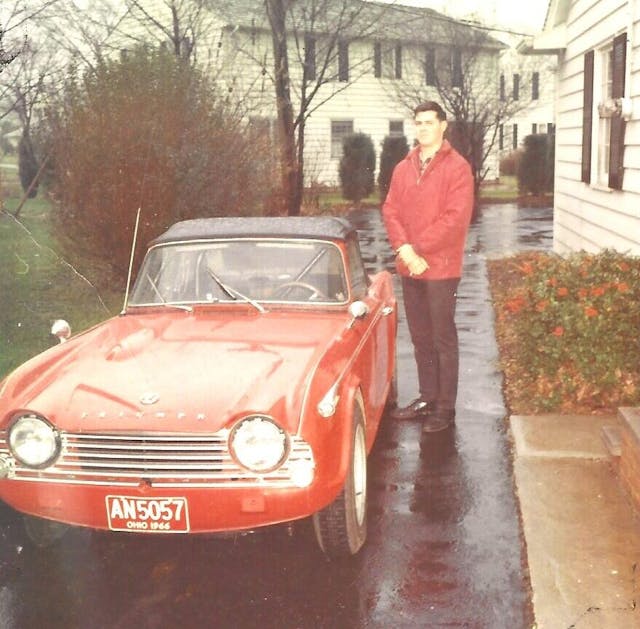
With that damage repaired and my old Chevy tow car sold, I had re-installed the windshield and top and prepped it for the trip east to Newport, Rhode Island, for Navy Officer Candidate School. I couldn’t afford new tires so mounted its two best OE Michelin X radials in front and my two best Dunlop “universal” racing tires in back. Mixing radial with bias-ply tires was not recommended, but the Triumph looked good with bigger tires in back and handled surprisingly well.
The car had spent most of that winter sitting in the parking lot at OCS, often under a coating of snow, but served me well for occasional trips into town on weekend leave. (Years later, famed fellow auto writer Ken Gross told me that he was also at Navy OCS that winter and thought my fat-rear-tired, roll bar–equipped, ex-racer Triumph was easily the “coolest car” in the lot.)
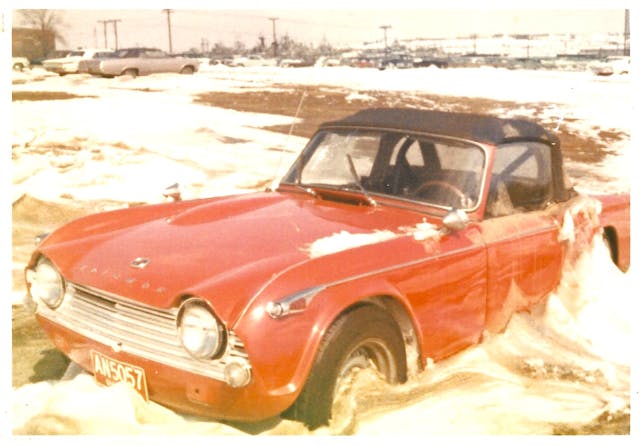
Because my degree was Mechanical Engineering, my orders out of OCS were to report to Engineering Officer Training School in San Diego, California, then to travel back east to a ship based in Mayport, Florida, that would be undergoing “dry dock” reconditioning in Charleston, South Carolina. Not the assignment I had hoped for, but I had no choice. At least, I thought, I would have time enough to tour some interesting country on my way west after stopping by Cleveland and Detroit for farewells to family and friends. Then I would head to southern California with a planned stop in Denver to visit that aunt.
The rest of the trip
I spent the better part of a week staying at my kind aunt’s apartment, with a rental car to get around. When my once-trusty TR4A was finally ready, I hopped a bus from Denver back to pay the man and pick it up. Once back on the road, I took it easy at first to break in the rebuilt engine and gain confidence that it would stay together, which it did. Nice job by that mechanic, as it turned out!
With no more planned stops, I headed west to San Francisco, a city I had always wanted to see, then south down the Pacific Coast Highway (PCH, aka CA Highway 1) to Los Angeles, where I had more family to visit, then further south to the San Diego Naval Station.
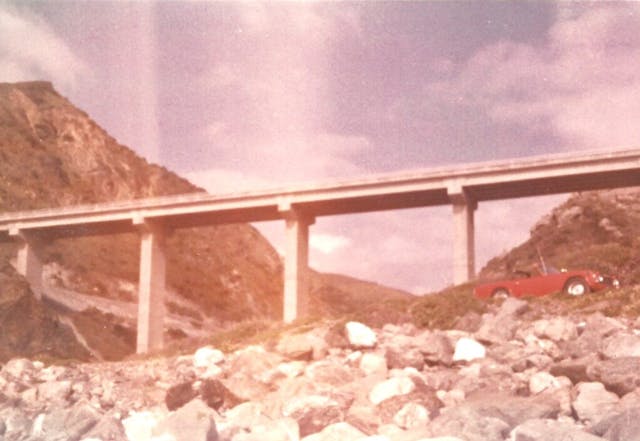
Spending all that travel time in this sturdy, handsome sports car that had started as a road car, worked hard as a race car, then found itself back on the road—a car that had never let me down until that spun bearing, despite the two wrecks and all the thrashing I had put it through—provided me the opportunity to evaluate it again as a (hopefully) reliable daily driver. Its seats were decent both on the road and on the track. Its three-spoke, wood-rimmed, aluminum steering wheel and full set of gauges looked great and functioned well in its pretty, polished-wood dash. Handling was agile and the ride stiff but tolerable despite the racing shocks I had installed. The Triumph had definitely been the right choice vs. the (SCCA DP-class) competitors I had considered, and it was a car with which I had fallen deeply in love.
San Diego duty
By a happy accident of timing, I reported to San Diego two months before the next training class began so had all that time, living in the Bachelor Officers Quarters (BOC), to enjoy the beach and explore the area by day and meet local women at night. It didn’t help that the city was overrun with sailors at the time, but I soon learned that driving across the bridge to the Naval Air Station Officers’ Club on Coronado Island improved my chances, since a fair number of women regularly visited there hoping to meet Navy aviators (hello Top Gun).
Besides some classroom time, my three months of training consisted mostly of going out very early in the morning on a WWII destroyer, learning all about its boilers, its engines, and its electrical, fresh water, fire, and emergency systems, then returning to port late afternoon. It was rigorous and tiring but left me free to party (though not very late) at night. One night on my way back to the base in the Triumph, I stood on the gas in second and shifted up to third—just for fun, and to hear my barely muffled exhaust roar one last time before turning in for the night—and was quickly pulled over by a waiting San Diego cop. I had been drinking (moderately, as always) but easily passed his roadside sobriety test, so he let me go. My only other encounter with San Diego enforcement was a ticket for loud exhaust, which I managed to beat without further muffling.
Back across country
When my training was done, I had to drive all the way back east to report to my ship in Charleston, South Carolina, and chose a southern route through El Paso, Texas, and New Orleans, Louisiana, another place I had always wanted to see. At the former, I risked a day trip to Juarez, Mexico, and got slightly hit in the rear while creeping in line to get back into the States. Following a brief conversation in his broken English and my marginal Spanish, the apologetic Mexican driver gave me a few bucks to replace the taillamp lens broken by his bump. In New Orleans, I talked a bar band into letting me sing (the Doors’ “Light My Fire”) with them, then embarrassed them and myself with a lousy performance. Thankfully, the rest of that trip was uneventful.
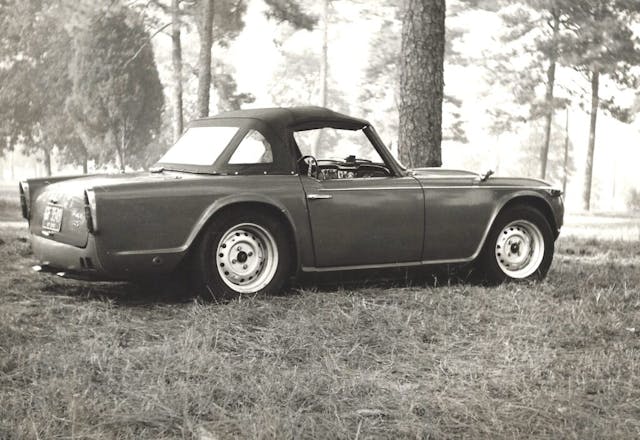
My ship was the USS Luce, DLG (Destroyer Leader Guided Missile) 7—a handsome, complex warship much bigger than a destroyer but smaller than a cruiser. It was in dry dock in Charleston undergoing extensive repair and renovation, and since a lot of that work involved its (fairly new and troublesome at the time) 1200-psi propulsion system, that kept me, as Main Propulsion Assistant to its Engineering Officer, very busy.
I soon decided that I needed a more practical car so ordered a new-for-1968 Chevrolet Nova coupe: V-8, four-speed floor shift, handling suspension. Since it was built—on Chevy’s sporty Camaro platform—at a plant where I had worked for a while, I knew people there who would ensure that mine was built right. Reluctantly, I put my Triumph up for sale. My initial ad in Competition Press showed it in race trim and hyped it as a “beautiful, fast, and dependable D-Production winner,” and my asking price was $2500. Then I cleaned and polished it top to bottom, took more photos of it for local ads, and eventually sold it to a young man who planned to take it racing, just as I had. I wished him well and wiped real tears from my eyes as I watched it disappear into the distance.
A final farewell
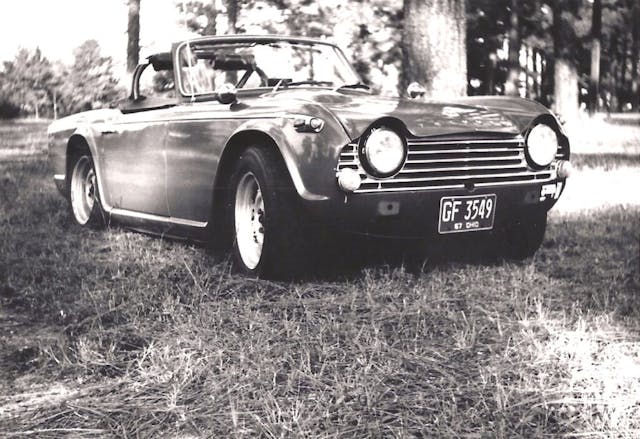
After serving for more than a year—including three hard-working, no-fun months of “refresher training” at Guantanamo Bay, Cuba, in a job I hated on the Luce—I decided to volunteer for Navy Flight Training. I had always wanted to fly and had done two years of Air Force ROTC at Duke before dropping out. One memorable but scary adventure during that time was a very risky, rushed, emergency trip through a major storm up the East Coast to join the search for the lost nuclear submarine USS Scorpion with two of our four propulsion-dependent boilers down for service. We got the order to join that search the very night we returned from Gitmo, with two-thirds of our officers and crew on shore leave, so we were severely understaffed even after Navy Shore Patrol had rounded up and returned a lot of them.
I passed all the tests and was waiting to be sent to Pensacola, Florida, for flight training when my ship set sail for a six-month deployment in the Middle East. However, when my orders finally came through en route, I was able to gratefully jump ship at Recife, Brazil, and catch a flight back to Florida. Why is this relevant to my then-long-gone Triumph? Because, driving back to my apartment one Friday afternoon after a long day of flight training in Pensacola, I noticed some race cars practicing on a parking-lot course just a block off the main road. One of them looked very familiar.
I stopped, turned around, and drove closer to get a look. Sure enough, there was my once-faithful red Triumph circulating around, looking very fine, in a practice session. When it came in, I found the nice young man to whom I had sold it getting out of the car. When he took off his helmet, he was as surprised to see me there as I was to see him. He was fulfilling his dream of going SCCA racing, just as I had, and was having a great time doing it.
I wished him well and headed home but was unable to come back and watch him race that weekend due to other commitments. And I never got his contact information to follow up. But that last, brief encounter with my much-loved TR4A made me feel very warm inside. And I’m sure that tough little Triumph was delighted to be back in racing trim and competing again.
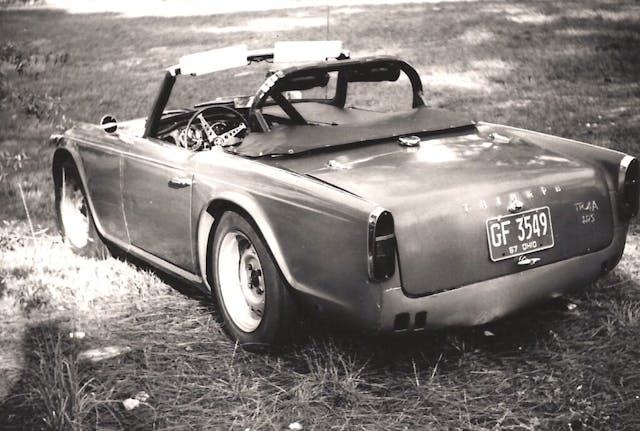
***
Check out the Hagerty Media homepage so you don’t miss a single story, or better yet, bookmark it. To get our best stories delivered right to your inbox, subscribe to our newsletters.
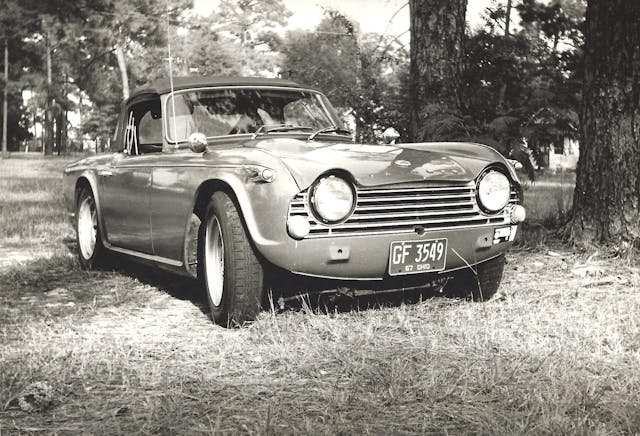


Enjoyed this, Gary, well done!
Absolutely great story from end to end. I only wish that I had taken a lot of pictures of some of my favorite cars – just never occurred to me at the time – like Gary did. They added greatly to all three installments.
My first 4 wheeled Triumph was a 66 TR4A. Sold in May of 2000. Still regret that to this day.
Great writing, Gary!! I also can relate to it, as in 1967 I landed in Europe and made my way to several F1 tracks that summer; the Ring was my first where I drank beer with young Germans I met track side. Luckily, over the next several years living abroad I was fortunate to go to Le Mans every year. Thanks for sharing!!
Another great chapter in this story. I also love the pictures to go along with it. Hopefully your triumph is still out there racing away.
Great story, Gary–what caught my eye was your comment about being in AF ROTC at Duke? when was that? I was there 1962-66 and was commissioned at graduation. If you remember a black Renault 4CV (or two–the other was my roommate’s!) in the West Campus student parking lot, that was mine. And I still have it!
Really enjoyed this story, reminded me of my own military career and the memorable travels between assignments. I miss moving somewhere new and having that sense of so much life and adventure ahead of me.
Enjoyed the chapters, Gary! Thanks for sharing your story! Just curious what type of WWII destroyer you were referring to as my father served on Fletcher and Sumner class destroyers in WWII.
To Mike: I was at Duke 1961-1965, and in AF ROTC the first two of those years. It proved a burden on top of a heavy engineering class load — and, frankly, I didn’t like the BS harassment (“Mister, your belt buckle needs shined and your sideburns are too long.”) so I dropped out after sophomore year. Little did I know I’d endure that and more in Navy OCS just a few years later. Sorry, I don’t recall seeing any Citroen 4CVs there, but I parked (my 1963 Chevy II convertible) south of by Wannamaker after joining Delta Tau Delta fraternity. I hope your service experience was better than (most of) mine, and that your 4CV is still running well.
To Trekker: Sorry, can’t recall what class of destroyer they were using for Engineering Officer training in San Diego in 1967. I do remember that the steel deck we often napped on while returning to port was very hard.
A fine story, and very well told. My wife saw the photo of your car while reading over my shoulder, and then took over my computer since she kept seeing place names she knew. Her family is full of Navy men who served in many of the same places you did, and she was born in Gitmo!